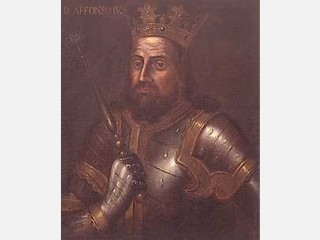
Alfonso I Of Portugal biography
Date of birth : -
Date of death : -
Birthplace : Guimarães, Portugal
Nationality : Portuguese
Category : Historian personalities
Last modified : 2010-11-20
Credited as : King of Portugal, son of Henry of Burgundy, Count of Portugal,
Alfonso I (1109-1185) was the first king of Portugal. An accomplished warrior, he won independence from Castile and enlarged his realm at the expense of the Moslems.
Alfonso Henriques was born at Guimarães in the castle of his father, Henry of Burgundy, Count of Portugal. His ambitious mother, Teresa, daughter of Alfonso VI of Leon and Castile, ruled the county as regent after Henry died in 1112. When Alfonso rebelled against his mother in 1127 and took control of the county, he immediately faced an invasion by his cousin, the new king of Leon, Alfonso VII. The Leonese king refused to recognize the independence of Portugal until 1143, when Alfonso Henriques became a vassal of the pope; the two cousins then signed a treaty in Zamora under the auspices of the Church.
Alfonso was now free to enlarge his domain by conquering lands from the Moslems. His first great victory had been against the Almoravids at Ourique on July 25, 1139. This battle established Alfonso's reputation as a warrior, and it was about this time that he abandoned the title of count for that of king. On March 15, 1147, he captured Santarem, setting the stage for the major campaign of his career. In May a company of English, German, and Flemish Crusaders en route to the Holy Land arrived in Portugal and entered into a lucrative agreement with Alfonso. They joined the royal forces in the 17-week siege of Lisbon, which ended with the Moslems' capitulation on October 25.
Alfonso now addressed himself to the task of settling the Tagus Valley in order to assure its security against Moslem attack. Several of the Crusaders had accepted his offer of land grants, but the population was still not dense enough to resist Moslem incursions. The defense of this region was therefore entrusted to the Knights Templar, and the task of populating the empty lands between Lisbon and Leiria was assigned to the Cistercian monastic order.
Between 1150 and 1169 Alfonso campaigned constantly in the south. He succeeded in containing the Moslems and in making some territorial conquests. To secure peace with the new king of Leon, Ferdinand II, Alfonso offered him his daughter Urraca, whom Ferdinand married in 1165. Two years later, however, the kings quarreled and Alfonso invaded Galicia, the southern part of which was in dispute. In 1169 Alfonso aided in the siege of Badajoz but was in turn besieged by Ferdinand's troops, who had come to help the surrounded Moslems. Seeking to escape, Alfonso was caught in the gate of the city and broke his leg. He was captured by Ferdinand, and as part of the ransom arrangements he was forced to abandon all claims upon Galicia. As a result of his accident, the King never fought again, and the burden of military leadership passed to his son Sancho.
The year 1171 brought a heightening of the Almohad threat, but in 1172 Alfonso negotiated a 5-year truce with the caliph. As the decade drew to a close, Pope Alexander III officially recognized Alfonso's conquests and bestowed full royal dignity on him and on his successors. The last years of Alfonso's reign were marked by a continuation of the struggle with the Almohads. He died at Coimbra on Dec. 6, 1185, having reigned for 57 years.
The significance of Alfonso's reign as the beginning of a Portuguese national state is clear. But how and why Portugal was able to emerge as an independent power at this time are complex questions. Explanations based on a hypothetical Lusitanian spirit must be rejected in favor of answers founded on the political and geographic realities of the epoch. Although northern Portugal is well protected from Spanish incursions by the rugged Douro Gorge, the most significant roots of Portuguese independence lie in the political weakness of 12th-century Castile, which was unable to prevent the independence of either Leon or Portugal. Alfonso must thus be seen as a consummate politician who took full advantage of the moment to declare his country's independence.
A summary of Alfonso l's achievements, as well as a discussion of the political and geographic factors in the emergence of the Portuguese state, may be found in H.V. Livermore, A New History of Portugal (1966).
















